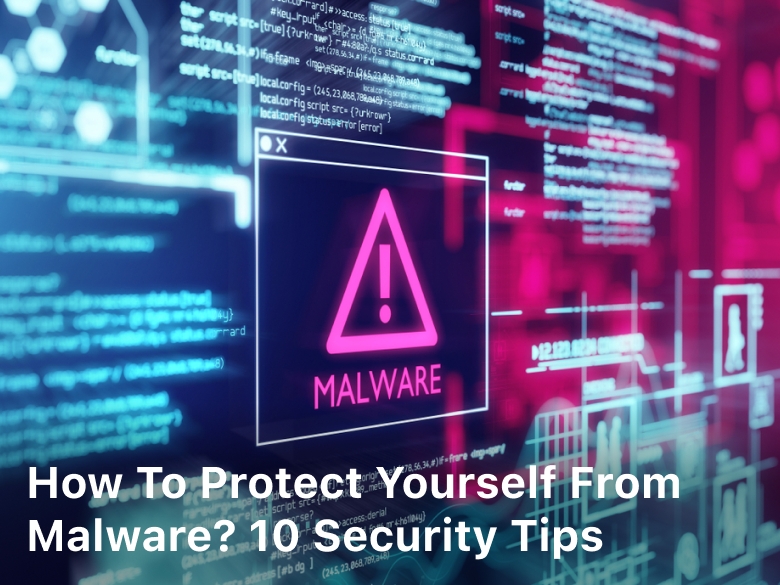How to Protect Yourself From Malware? 10 Security Tips
vpnmighty.com. How to Protect Yourself From Malware? 10 Security Tips – Discover 10 crucial security tips to safeguard your system from malware attacks. Learn how to protect yourself from malware effectively and keep your digital world secure.
In today’s digital age, protecting yourself from malware is a top priority. Malware, short for malicious software, encompasses a range of threats such as viruses, spyware, ransomware, and more.
These threats can compromise your personal data, disrupt your digital life, and even lead to financial losses. Fortunately, there are proactive steps you can take to shield yourself from these risks.
This article provides a comprehensive guide on how to protect yourself from malware, offering you 10 security tips that can make a significant difference in safeguarding your online presence.
How to Protect Yourself From Malware
Malware attacks can be devastating, but with the right precautions, you can significantly reduce your vulnerability. Here are 10 security tips to help you stay safe:
1. Keep Your Software Updated
When it comes to cybersecurity, keeping your software updated is akin to building an impregnable fortress. Software updates, often released by developers, serve several crucial functions that safeguard your digital landscape:
- Strengthening Vulnerabilities
Software updates frequently include patches that address known vulnerabilities. Hackers often exploit these weaknesses to gain unauthorized access to systems. By regularly updating your software, you effectively close these entry points and thwart potential cyber attacks.
- Enhancing Security Features
Developers continually refine and enhance the security features of their software. Updates introduce advanced security protocols that counteract evolving cyber threats. Neglecting updates could leave your system vulnerable to newer, more sophisticated attacks.
- Addressing Compatibility Issues
In a digital environment characterized by multiple software components, compatibility is key. Updates ensure that your software interacts seamlessly with other applications, reducing the chances of system malfunctions that attackers might exploit.
2. Install a Reliable Antivirus Software
Antivirus software is akin to a vigilant guardian that stands watch over your digital domain. It’s a specialized program designed to identify, prevent, and remove malicious software threats.
These threats can range from traditional viruses to more sophisticated malware, spyware, and ransomware. The primary objective of antivirus software is to identify and neutralize these threats before they can compromise your data, privacy, or the functionality of your devices.

3. Be Cautious of Email Attachments and Links
The digital landscape has revolutionized the way we communicate and share information. However, this convenience comes with its own set of challenges, particularly in the realm of cybersecurity.
Cybercriminals often exploit email platforms as a gateway to unleash malicious software and phishing attacks. To shield yourself from these threats, exercising caution when dealing with email attachments and links is essential.
4. Enable Firewall Protection
Firewalls act as a barrier between your device and potential threats from the internet. Ensure your operating system’s firewall is turned on, and consider using a hardware firewall for added security.
At its core, a firewall functions as a gatekeeper that regulates the flow of data between your device and the broader internet. It examines incoming and outgoing network traffic and makes decisions based on predefined rules. The objective is to allow legitimate data to pass through while blocking unauthorized or potentially harmful traffic.
5. Download Software from Trusted Sources
Only download software, apps, and files from reputable sources. Avoid third-party websites or torrents, as these can often distribute malware disguised as legitimate content.
Untrusted sources can be breeding grounds for malware, spyware, adware, and other malicious software. Cybercriminals capitalize on users’ desires for free or pirated software by disguising harmful programs as legitimate downloads.
Unsuspecting users who download and install such software unknowingly expose their devices and sensitive information to potential breaches.
6. Use Strong, Unique Passwords
Create strong passwords for your online accounts and ensure each account has a unique password. Consider using a reliable password manager to keep track of your credentials securely.
Passwords act as the virtual keys to your online kingdom. A strong password is the difference between uncompromised security and potential vulnerability.
Cybercriminals are adept at exploiting weak passwords to gain unauthorized access to your accounts, potentially leading to data breaches, identity theft, and financial loss.
7. Implement Two-Factor Authentication (2FA)
Two-factor authentication adds an extra layer of security by requiring you to provide a second form of verification, such as a code sent to your phone, in addition to your password.
Two-Factor Authentication (2FA), often referred to as multi-factor authentication, stands as a powerful shield against unauthorized access and identity theft. This advanced security practice adds an extra layer of protection, enhancing the security of your online accounts.
At its core, 2FA is a security process that requires users to provide two distinct forms of identification before gaining access to an account or system.
This process significantly reduces the risk of unauthorized access, as it combines something you know (your password) with something you have (a physical device or code).
8. Regularly Backup Your Data
Frequently backing up your important data to an external hard drive, cloud storage, or another secure location can help you recover your files in case of a malware attack.
In the digital age, where our lives are intertwined with technology, the importance of data is unparalleled. From cherished memories to critical work documents, our digital assets hold immense value.
However, the fragility of digital storage and the omnipresent threat of data loss necessitate a robust data backup strategy. Regularly backing up your data is not merely a precaution—it’s an essential practice to ensure the preservation of your digital life.
9. Educate Yourself About Phishing Scams
Phishing scams involve tricking individuals into revealing sensitive information. Learn to recognize phishing attempts, and never provide personal or financial information via email or unfamiliar websites.
In the intricate realm of cybersecurity, knowledge is your most formidable weapon. Phishing scams, which continue to evolve in complexity and cunning, are among the most prevalent threats targeting individuals and organizations alike.
Educating yourself about phishing scams is not a luxury—it’s a necessity to protect your sensitive information and personal data from falling into the wrong hands.
Phishing scams entail cybercriminals posing as legitimate entities to manipulate users into revealing confidential information, such as usernames, passwords, credit card details, or social security numbers. These scams usually arrive in the form of deceptive emails, messages, or websites that appear authentic.
10. Stay Informed About Current Threats
In the ever-evolving landscape of digital security, knowledge is your most potent armor. With cyber threats constantly advancing in sophistication, staying informed about current threats is not only a smart strategy—it’s essential for safeguarding your online presence.
Keep yourself updated on the latest malware threats and cybersecurity news. Staying informed will help you understand potential risks and take necessary precautions.
FAQs (Frequently Asked Questions)
How can I tell if my device has been infected by malware?
Signs of malware infection include slow performance, unexpected pop-ups, unauthorized access to your accounts, and changes in system settings. If you notice any of these signs, it’s important to run a malware scan and take appropriate action.
Can a strong password really make a difference in preventing malware?
Yes, a strong password can be a crucial line of defense against malware attacks. Hackers often use brute force techniques to guess passwords. Using a complex combination of letters, numbers, and symbols can make it significantly harder for them to gain unauthorized access.
What should I do if I accidentally click on a suspicious link?
If you click on a suspicious link, disconnect from the internet immediately. Run a full malware scan using your antivirus software. Change your passwords for important accounts and monitor your accounts for any unauthorized activity.
Is it safe to download apps from official app stores?
Generally, downloading apps from official app stores like the Apple App Store or Google Play Store is safer than downloading from third-party sources. These official platforms have security measures in place to minimize the risk of distributing malicious apps.
How often should I update my software?
Frequent updates are essential for keeping your software secure. Set your operating system and applications to update automatically whenever possible. Additionally, check for updates manually on a regular basis.
What is ransomware, and how can I protect myself from it?
Ransomware is a type of malware that encrypts your files and demands a ransom for their release. To protect yourself, regularly back up your data, avoid clicking on suspicious links or email attachments, and keep your software up to date.
In conclusion, safeguarding yourself from malware is an ongoing process that requires awareness, vigilance, and the implementation of best practices.
By following the 10 security tips How to Protect Yourself From Malware, you can significantly reduce your risk of falling victim to malware attacks and enjoy a safer and more secure digital experience.




